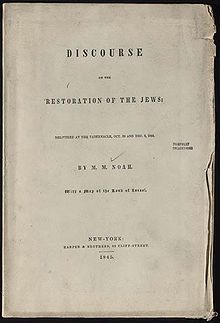Contents[show] |
[edit] Career
Noah engaged in trade and law, but when removing to Charleston, South Carolina, dedicated himself to politics.[edit] Diplomat
In 1811, he was appointed by President James Madison as consul at Riga, then part of Imperial Russia, but declined, and, in 1813, was nominated Consul to the Kingdom of Tunis, where he rescued American citizens kept as slaves by Moroccan masters. In 1815, Noah received a stunning blow;[4] in the words of US Secretary of State James Monroe, his religion was "an obstacle to the exercise of [his] Consular function." The incident caused outrage among Jews and non-Jews alike.[citation needed]Noah sent many letters to the White House trying to get an answer as to why they felt his religion should be a justifiable reason for taking the office of consul away. He had done well as consul and had even been able to accommodate the United States request to secure the release of some hostages being held in Algiers. Noah never received a legitimate answer as to why they took the office of Consul away from him. This worried Noah since he was afraid that this would set a precedent for the United States. He worried that this would block future Jews from holding publicly elected or officially granted offices within the United States.
Noah protested and gained letters from John Adams, Thomas Jefferson, and James Madison supporting church-state separation and tolerance for Jews.[5] Prominent Reform Judaism leader Isaac Harby was moved to write, in a letter to Monroe, "[Jews] are by no means to be considered as a religious sect, tolerated by the government. They constitute a portion of the People. They are, in every respect, woven in and compacted with the citizens of the Republic."[6]
[edit] Later career
Noah moved to New York, where he founded and edited The National Advertiser, The New York Enquirer (later merged into The Courier and Enquirer), The Evening Star, and The Sunday Times newspapers.In 1819, Noah's most successful play, She Would Be a Soldier, was produced. That play has since established Noah as America's first important Jewish American writer. She Would Be a Soldier is now included in college level anthologies.

From 1827-1828, Noah led New York City's Tammany Hall political machine.
He was a staunch supporter of slavery. He worried that emancipation would threaten the whole country's safety.
MacArthur Award-winning cartoonist Ben Katchor fictionalized Noah's scheme for Grand Island in his The Jew of New York. Noah is also a minor character in Gore Vidal's 1973 novel Burr.
The modern edition of Noah's writings is The Selected Writings of Mordecai Noah edited by Michael Schuldiner and Daniel Kleinfeld, and published by Greenwood Press.
American Conservative rabbi Henry Noah is a direct descendant[13].
- 1813 - 1814: Travels in England, France, Spain, and the Barbary States
- 1837 : Discourse of the Evidence of the American Indians being the descendants of the Lost Tribes of Israël
- 1844: Discourse on the Restoration of the Jews
[edit] References
- ^ "Jewish Virtual Library, Mordecai Manuel Noah". http://www.jewishvirtuallibrary.org/jsource/biography/MNoah.html. Retrieved 2008-01-10.
- ^ New York Jewish History, New York State Archives, Jewish History Resources
- ^ "Antisemitism, Mordecai Manuel/Cart Catalogue". January 2010. http://www.americanjewisharchives.org/.
- ^ Hasia R. Diner, The Jews of the United States, 1654 to 2000, p.59
- ^ Richard H. Popkin, "Thomas Jefferson's Letter to Mordecai Noah," American Book Collector 1987 8(6): 9-11
- ^ "A "portion of the People"", Nell Porter Brown, Harvard Magazine, January-February, 2003
- ^ Noah, Mordecai (1837). Discourse on the Evidences of the American Indians being the Descendants of the Lost Tribes of Israel. J. Van Norden. http://books.google.com/books?id=h1G-AAAACAAJ&dq=DISCOURSE+ON+THE+EVIDENCES+OF+THE+AMERICAN+INDIANS+BEING+THE+DESCENDANTS+OF+THE+LOST+TRIBES+OF+ISRAEL. Retrieved 2008-10-02.
- ^ Mordecai Manuel Noah. "DISCOURSE ON THE EVIDENCES OF THE AMERICAN INDIANS BEING THE DESCENDANTS OF THE LOST TRIBES OF ISRAEL". Oliver’s Bookshelf. http://olivercowdery.com/texts/noah1837.htm. Retrieved 2008-09-03.
- ^ Noah, Mordecai (1845). Discourse on the Restoration of the Jews. Harper & Brothers. http://books.google.com/books?id=7fUEKQAACAAJ&dq=Discourse+on+the+Restoration+of+the+Jews. Retrieved 2008-10-02.
- ^ http://www.jewishmag.com/142mag/mordecai_manuel_noah/mordecai_manuel_noah.htm
- ^ Major Noah, American-Jewish Pioneer, by Isaac Goldberg, Jewish Publication Society of America, 1936, pg. 196
- ^ http://books.google.com/books?id=pJMDR73E8FwC&printsec=toc&client=firefox-a#PPA315,M1
- ^ http://ha-historion.blogspot.com/2006_12_01_archive.html
- Selig Adler & Thomas E. Connolly. From Ararat to Suburbia: the History of the Jewish Community of Buffalo (Philadelphia: the Jewish Publication Society of America, 1960, Library of Congress Number 60-15834).
[edit] Further reading
- Mordecai Manuel Noah: Travels in England, France, Spain, and the Barbary States: In the Years 1813-14 and 15
- Major Noah: American-Jewish Pioneer, Isaac Goldberg, The Jewish Publication Society of Philadelphia, 1936.
- The Selected Writings of Mordecai Noah, Michael Schuldiner and Daniel J. Kleinfeld, Greenwood Press, 1999.
[edit] External links
 Media related to Mordecai Manuel Noah at Wikimedia Commons
Media related to Mordecai Manuel Noah at Wikimedia Commons
